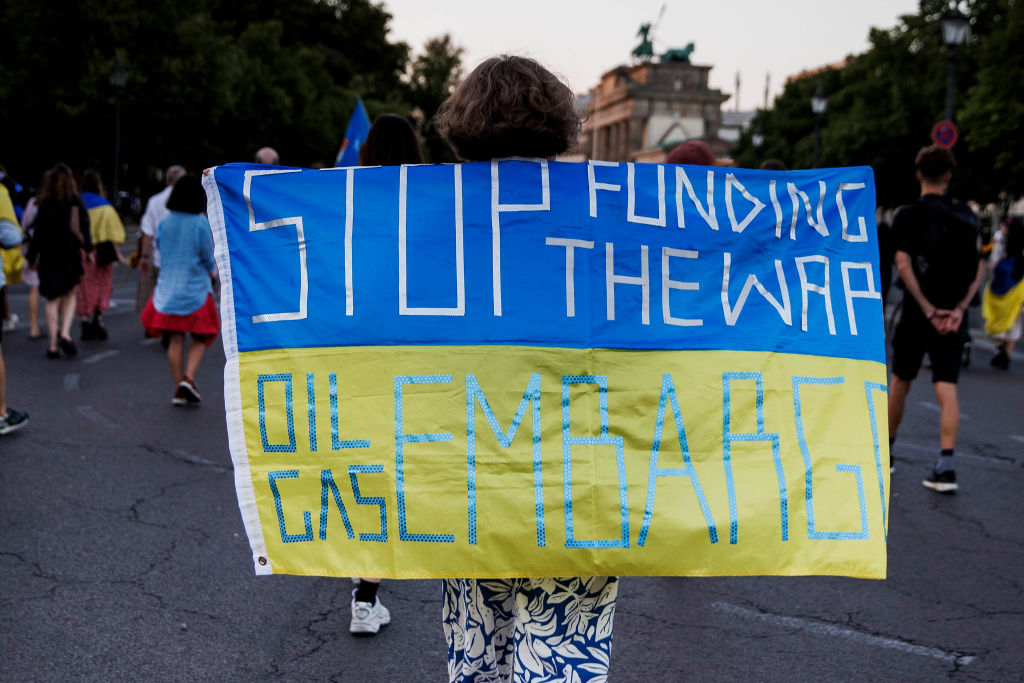Exclusive: Ukraine urges West to slash Russian war revenues

The West needs to put Russia under more pressure and slash its revenues from soaring oil and gas prices argued Naftogaz, Ukraine’s state energy provider.
Naftogaz’s chief media adviser Svitlana Zalishchuk told City A.M. that Europe should move forward with caps for oil and gas prices to squeeze the Kremlin’s hefty takings from this year’s commodities boom.
She praised the European Union’s series of sanctions packages, but raised concerns over the lack of agreement within the bloc for price caps.
Zalishchuk said: “We see that they haven’t been realised because there’s no unity in the European Union on that front. So, we believe that smart measures coming from our international partners are still needed to influence the revenues the Russians earn for the energy resources.”
The EU has spent nearly €100bn on Kremlin-backed oil, gas and coal supplies since Russia’s invasion of Ukraine, according to research from Beyond Coal.
While the bloc has brought in plans to phase out Russian coal and oil imports, gas purchases remain widespread despite Gazprom squeezing supplies via key pipelines and recently cutting supplies into Austria, Italy and Moldova.
The EU still remains divided over the prospect of gas price and oil price caps.
It’s executive arm, the European Commission has previously called for both measures but multiple member states have raised concerns.
This includes Germany and Netherlands, which are both worried that unilateral price caps on Russian fossil fuels could worsen supply shortages and boost the bargaining power of other trading partners.
Securing supplies: Ukraine’s race against time
Naftogaz has been racing against time to top up supplies ahead of winter, to ensure Ukrainians have sufficient supplies to meet their energy needs in the coldest months of the year.
While Ukraine’s armed forces have achieved successful counter-offensives in the Donetsk region over the past month, most recently taking back Lyman from Kremlin-backed forces, the country has also managed to top up its gas supplies to around 15bn cubic meters ahead of winter.
This is comparable to rates secured in 2016-2018, prior to the current crisis.
Zalishchuk revealed domestic production of natural gas fell just two per cent in the last eight months.
She described Naftogaz’s workers as “courageous” in ensuring energy supplies were still generated and stored amid the conflict, with the company reporting casualties among its employees.
However, Naftogaz still fears a shortfall of 1-3bn cubic meters.
The overall deficit depended on whether Russia further targeted Ukraine’s energy facilities in the coming months and temperatures this winter – with a colder winter likely to drive up demand.
While this is less than the 5.8bn cubic meter deficit it was forecasting in June earlier this year, Ukraine is continuing to suffer from its lack of purchasing power.
Zalishchuk argued that Ukraine simply cannot afford to pay market rates for oil and gas, and that it would not be possible to raise bills on consumers – with the United Nations forecasting as many as 16m people have either been displaced or are in need of humanitarian support.
The media adviser said: “We need not only loans that Naftogaz can use to import gas, but we need direct international financial support that can help Ukrainians, especially those most vulnerable, survive through the winter.”
She called on international financial institutions such as the European Investment Bank to help support Ukraine’s needs, alongside grants from countries such as France, Germany, and the US.
The energy company remains in a protracted legal dispute with Gazprom, and filed a request for arbitration in the International Court of Arbitration in Paris last month.
It has taken the Kremlin-backed gas giant to court over its apparent failure to pay transit fees for supplies of gas transmitted through the country’s pipelines.
She concluded: “Ukraine will continue to use all available legal and political instruments to counteract Russian aggression.”